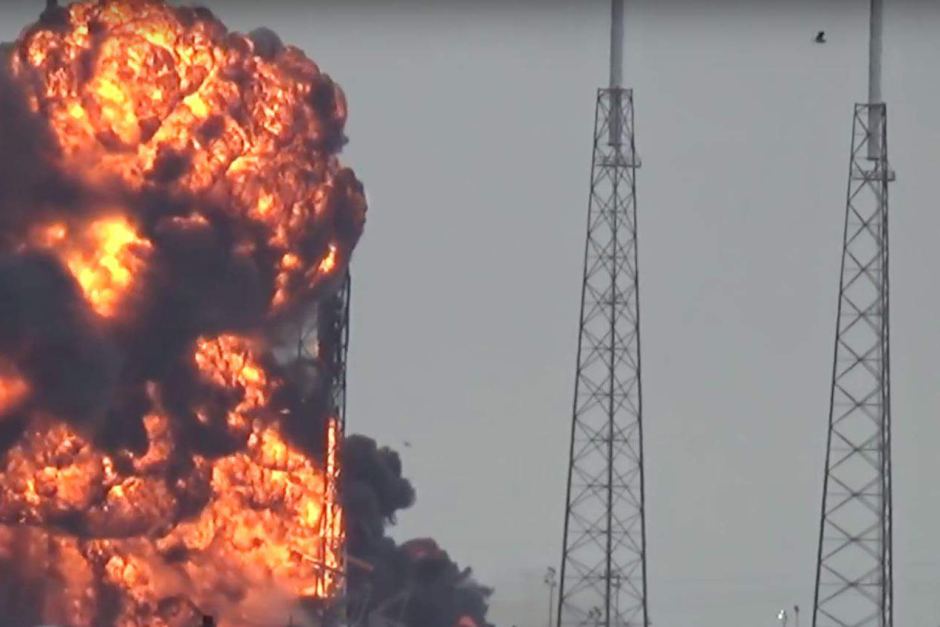Category: Spacecraft / Transport / Space Exploration / Science and Technology
SpaceX rocket explodes on launch site at Cape Canaveral
Thursday, 1 Sep 2016 22:10:03

SpaceX Falcon 9 rocket explodes on launch site at Cape Canaveral on September 2, 2016. (Supplied: US Launch Report)
An explosion has destroyed a Falcon 9 rocket belonging to Elon Musk's SpaceX during routine test firing at Cape Canaveral in Florida, shaking buildings kilometres away and sending a thick plume of black smoke pouring into the air.
Key points:
- "Anomaly" during the static fire test led to explosion
- No injuries sustained in accident
- Elon Musk says exact cause not yet known
SpaceX said there were no injuries and that an "anomaly" during the static fire test resulted in the loss of the rocket and the communications satellite owned by Israel-based Spacecom, which was going to be used by Facebook.
A spokesman for Cape Canaveral Air Force Station said there was a "significant" explosion just after 9:00am (local time) at Launch Complex 40, which is leased by SpaceX.
"Our emergency management teams are responding," spokesman Bryan Purtell said.
People in buildings several kilometres from the facility wrote on social media that they felt the blast, and live television images showed thick black smoke coming from the site.
Local authorities said residents were not at risk.
"There is no threat to general public from catastrophic abort during static test fire at SpaceX launch pad," the Brevard County Emergency Management Office said in a tweet.
Cause still unknown
Mr Musk said on Twitter that the loss of the rocket happened while it was being filled with propellant and that the problem originated around the upper stage oxygen tank.
"Cause still unknown. More soon," he tweeted.
Facebook would have been among the customers for bandwidth on the destroyed satellite.
Last year, Facebook said it was partnering with Eutelsat Communications to boost data connectivity to large parts of sub-Saharan Africa.
In a post from Africa, Facebook founder Mark Zuckerberg said he was deeply disappointed at the loss of the satellite, which he said would have provided connectivity to many entrepreneurs and everyone else across the continent.
"We remain committed to our mission of connecting everyone, and we will keep working until everyone has the opportunities this satellite would have provided," he wrote.
Thursday's launch pad explosion could derail the sale of Spacecom for $285 million ($377 million) to Beijing Xinwei Technology Group.
'It shook us so bad'
Robin Seemangal, a space reporter with the Observer newspaper, quoted a source at the facility who told him it felt like the building they were in had been hit by lightning.
"We actually thought the building was collapsing, it shook us so bad," Mr Seemangal wrote in a tweet, quoting his source.
It was not immediately known if SpaceX's launch pad was damaged or what the exact impact would be on the dozens of NASA and commercial satellite missions on its launch schedule.
But French-based satellite provider Eutelsat said the rocket explosion would have a potential 50 million euro ($74 million) impact on its business up to 2019.
SpaceX had recovered from a June 2015 launch accident that destroyed a load of cargo headed for the International Space Station.
The pad where SpaceX's rocket was being prepared for launch is one of two operated by the company. Its other launch site is at Vandenberg Air Force Base in California.
Mr Musk founded SpaceX in 2002 with the goal of slashing launch costs to make travel to Mars affordable.
The company plans to fly its first unmanned spacecraft to Mars in 2018 and send humans to Mars as early as 2024.
Reuters
- About Us
- |
- Terms of Use
- |
-
 RSS
RSS - |
- Privacy Policy
- |
- Contact Us
- |
- Shanghai Call Center: 962288
- |
- Tip-off hotline: 52920043
- 沪ICP证:沪ICP备05050403号-1
- |
- 互联网新闻信息服务许可证:31120180004
- |
- 网络视听许可证:0909346
- |
- 广播电视节目制作许可证:沪字第354号
- |
- 增值电信业务经营许可证:沪B2-20120012
Copyright © 1999- Shanghai Daily. All rights reserved.Preferably viewed with Internet Explorer 8 or newer browsers.




 Send to Kindle
Send to Kindle